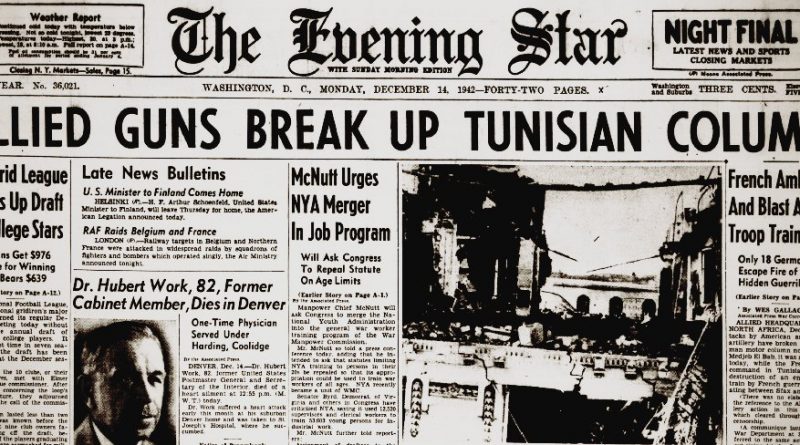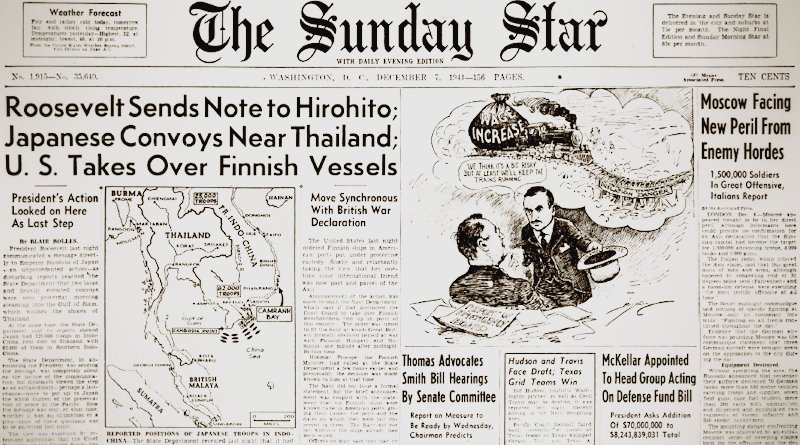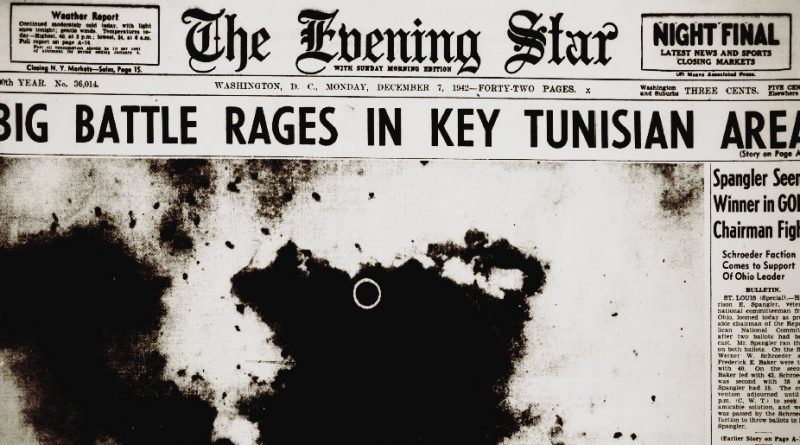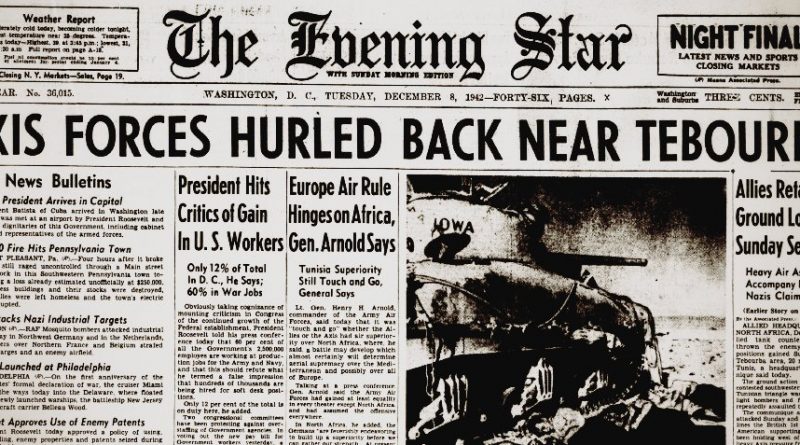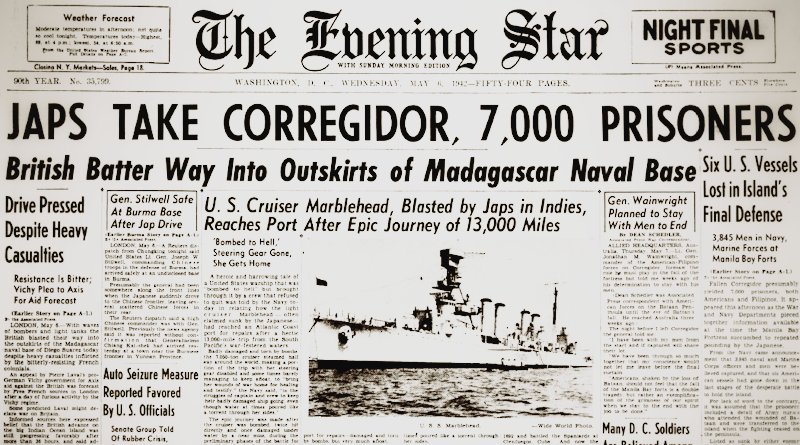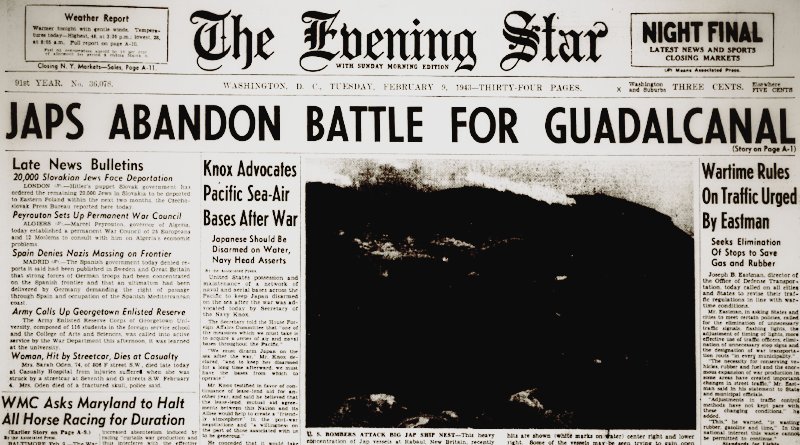World War II Chronicle: December 14, 1942
Click here for TODAY’S NEWSPAPER
On today’s front page: the NFL has decided to still have a football season in 1943 but skipped the draft of college players, while former heavyweight boxers Max and Buddy Baer have reportedly enlisted as privates in the Army Air Force… Page two tells of an appendectomy aboard the submarine USS Seadragon back in September. Although Pharmacist’s Mate 1st Class Wheeler B. Lipes had to use kitchen utensils and did not have surgical training — and the sub was in enemy waters — the operation was a success. Lipes became a national hero, but the Navy was not pleased and the Surgeon General wanted him court-martialed. The newspaperman who interviewed Lipes got a Pulitzer Prize for the story, but the life-saving corpsman only got a Navy Commendation Medal — 60 years after the surgery…
On page three, Army Air Force chief Lt. Gen. Henry H. “Hap” Arnold is pictured in San Antonio telling recruits that the United States now has a powerful new weapon. It’s possible that he is hinting at the development of the atomic bomb, as on Dec. 2 scientists working under the stands of University of Chicago’s Stagg Field conducted the first man-made self-sustaining nuclear chain reaction…
Staff Sgt. Herman Bottcher, a German citizen who joined the U.S. Army after fighting in the Spanish Civil War, is also mentioned on page three. Bottcher earns a spot promotion to captain and before the new year will have earned two Distinguished Service Crosses at Buna… Sports section begins on page 14 which tells of the Washington Redskins’ upset victory over the Chicago Bears. Former coach and now Naval lieutenant commander George Halas is pictured on page 15.
Roving Reporter by Ernie Pyle
WITH THE AMERICAN FORCES IN ALGERIA — When Ralph Gower was a little fellow in Arkansas, a deaf man lived across the street.
The man could read lips, and Ralph learned the trick from him. He did it mainly to show off before the other kids.
A quarter of a century has passed, and today Sgt. Ralph Gower sits on the edge of a folding cot in a tent way out in the field of Africa.
It is a hospital tent, and wounded soldiers in red bathrobes loll around in it. Ralph Gower can talk to them, and he can understand what they say, solely because he learned lip reading as a prank when he was a child. For he is newly deaf, from the explosion of an enemy shell.
When I went to see him he had been deaf only a few days, but his lip reading was already perfect. It had all come back to him across those 25 years. We talked for half an hour and he never made a single mistake.
Sergeant Gower escaped without serious wounds other than the loss of his hearing. They say there is a 50-50 chance of his recovering his hearing, but even if he doesn’t he’s got two strikes on deafness to begin with.
Ralph Gower is 37. He was born in Truman, Ark., but his home address is now Route 3, Box 832, Sacramento, Cal. He used to be a draughtsman and a machine -screw operator. He served a hitch in the Army in his early 20s, and joined up again as soon as England and Germany started fighting. He is a machine-gun sergeant.
Gower came to Africa aboard a group of combat boats that got into trouble to take an Algerian harbor. Those who lived to tell the tale were miraculously lucky.
“Do you want to hear what it felt like?” Ralph asked.
I sat down on the edge of the next cot. “Sure I Do. What did it feel like?”
“It felt just like going into hell and back out again,” he said.
The boys around the tent all laughed loudly. That startled me, for I couldn’t see anything to laugh at. But gradually I caught it.
It seems that Sergeant Gower’s deadpan Arkansas wit keeps the whole tentful howling day and night. He never says anything obviously clever. He just says things with an odd twist. He never cracks a smile. His expression never changes.
Six dozen wounded boys gathered on nearby cots to listen as Ralph told me the whole story. He told it very gravely, but he was frequently interrupted by shattering laughter from his convalescing audience. It was friendly and admiring laughter.
“We were all down in one of the compartments of the boat,” he said. “That French ship came right up against us, and one of their shells came through the side. The damn thing exploded right in my face.”
Some of the wounded soldiers in the tent had been through the same lethal nightmare he was describing, but they laughed at that crack just as though Bob Hope had said it.
“I never heard a sound,” Ralph went on. “It just went ‘shist-ppfftt.’ That’s all I ever heard. Then I passed out.
“When I came to everything was quiet. I thought the battle was over. The ship was full of ammonia and smoke. You couldn’t hardly breathe. I liked to choked to death. My heart was shooting pains out in all directions. (Laughter). I couldn’t get enough air in my lungs. I couldn’t even get enough smoke, for that was all I was getting anyhow. (More laughter).
“I finally started climbing a ladder. When I stuck my head out on deck I couldn’t hear anything, but the air was full of tracer bullets. Then I realized there were dead men lying on the deck. I passed out. That fresh air was too much for me. (Laughter).
“When I came to again I was lying over by the rail with a stack of dead men. We had a hell of a time. Them dead men wouldn’t move much. (Laughter). I thought I was never gonna get out from under there.”
Thus the story went. Censorship doesn’t permit repeating the full details.
It was getting late, and we shook hands.
“Are you married,” I asked.
“Am I married?” he said. “No, I’m single. I mean to say I’m sensible.”
The wounded boys all roared.
Sometimes you leave a battle hospital feeling horrible inside, but I stepped out of that tent, under millions of African stars, feeling good about Americans who can go “into hell and back out again” and still laugh about it.
The driver mentioned by Pyle is most likely 24-year-old Pfc. Harold H. LeBaron, of Chemung County, N.Y., killed in action on Nov. 10, 1942. He is buried in Woodlawn National Cemetery in Elmira, N.Y.
Evening star. (Washington, D.C.), 14 December 1942. Chronicling America: Historic American Newspapers. Lib. of Congress.
https://chroniclingamerica.loc.gov/lccn/sn83045462/1942-12-14/ed-1/
